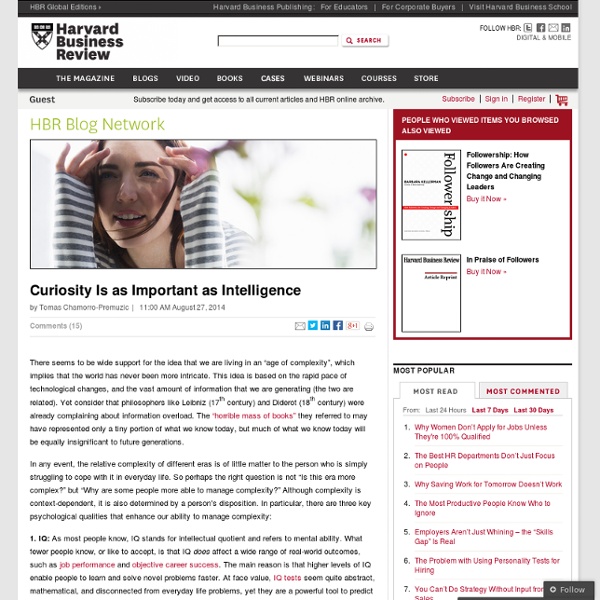Curiosity Is as Important as Intelligence - Tomas Chamorro-Premuzic

Book : Purple Cow: Transform Your Business by Being Remarkable by Seth Godin
Fight Overthinking, That Destroyer of Decision Making
When making decisions under pressure, many professionals are plagued with a fear of making the wrong choice, selecting an option that could lead to business failure. This fear of failure, in itself, is not a bad thing. In our new book What Business Can Learn From Sport Psychology, we examine how a fear of failure can actually provide powerful motivation for athletes and business professionals. But that's only if the fear of failure inspires thoughts of success and taking assertive actions toward a desired goal. So where does the fear of failure stem from? Related: The 4 Factors to Making the Best Decisions for You The root of overthinking. With overthinking, people want to make the right decision so much, they worry that they won’t be able to and lose sight of what it takes to make good decisions: a clear mind. Take driving for example. The trouble is, by examining all the component choices, you would be making decisions in a way that's very odd for your brain. Be instinctual.
Briggs Myers: When I Took This Personality Test, I Didn't Expect It To Be So Accurate
Have you ever heard of the Myers and Briggs personality test? It is a psychology test that Carl Jung’s and Isabel Briggs Myers designed to approach personality, how people perceive the world, and make their decisions. It actually opens up your eyes about yourself because you start to realize that not everyone has the same thought process and decision making process that you do. It has become the gold standard of psychological assessments, used in businesses, government agencies and educational institutions. Along the way, it has spawned a multimillion-dollar business around its simple concept that everyone fits one of 16 personality types (Source). Many businesses use the personality test, especially those with training-intensive programs, to help employees better understand themselves, as well as recognizing their strengths and weaknesses. First Letter: It will be either Extroverted (E) or Introverted (I).Second Letter (How do you take in information?) Take the test here.
Book : The Facebook Effect : The Inside Story of the Company That is Connecting the World - by David Kirkpatrick
Become So Good They Can't Ignore You
Google executive among hundreds dead from Nepal quake
NEW YORK (AP) — Dan Fredinburg, a Google executive who described himself as an adventurer, was among the hundreds who died in a massive earthquake that struck Nepal on Saturday. Google confirmed his death. Lawrence You, the company's director of privacy, posted online that Fredinburg was in Nepal with three other Google employees climbing Mount Everest. Google would not give further details. Fredinburg also helped start Save the Ice, an organization dedicated to raising awareness about global warming "through adventurous campaigns and events around the world," according to its website. Fredinburg started at Google in 2007. Google said it has launched a "person finder" tool for Nepal to help people find loved ones in the aftermath of the quake and "is working to get updated satellite imagery to aid in the recovery effort." The actress Sophia Bush, who has appeared in photos with Fredinburg posted by entertainment outlets, called him "one-of-a-kind" in a post on Instagram.
Book : The Corner Office - by Ashutosh Garg
5 Signs You’re Going To Make It Big One Day
Related:



